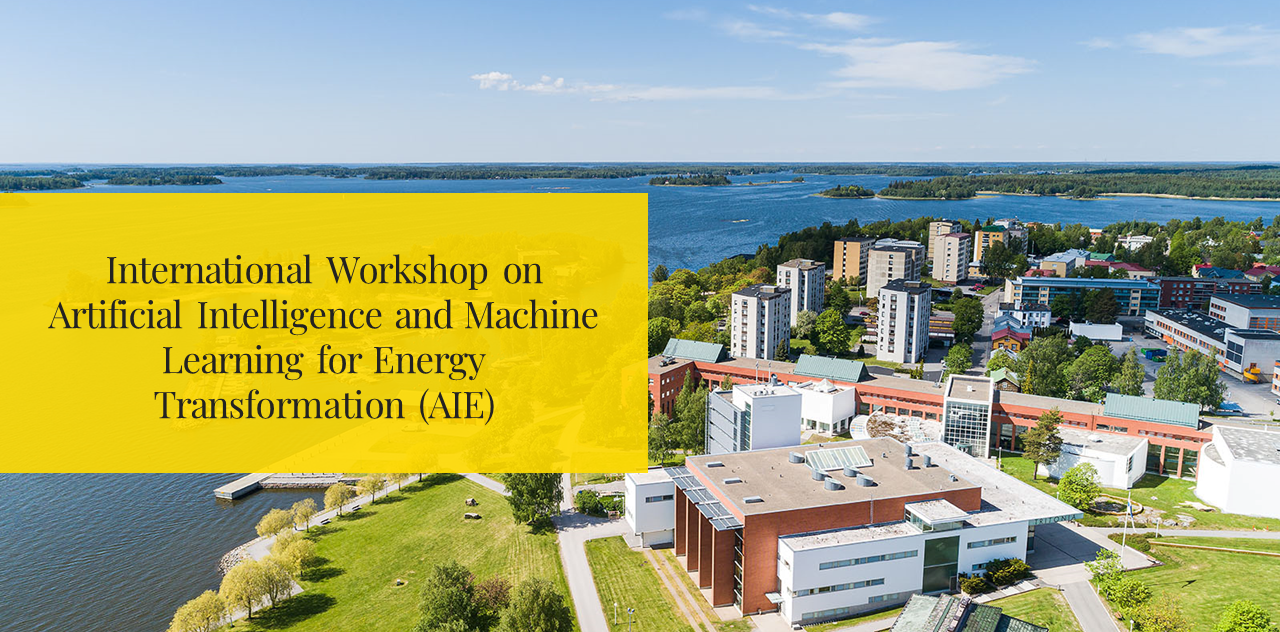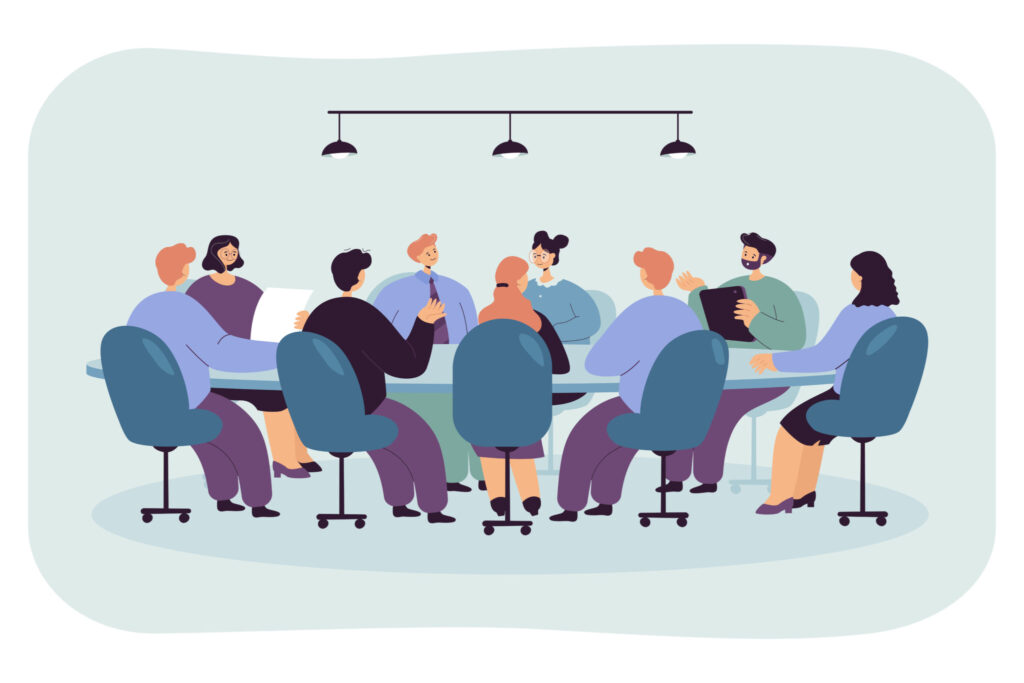Conference Facilities at the UNIVERSITY OF VAASA, Nissi auditorium, 20-22 May 2024
Sponsored by the IEEE Finland Section, the IEEE Finland Section IE/PE/IA/PEL Joint Chapter, Wapice Ltd. and EU OpenInnoTrain Network

The 2024 International Workshop on Artificial Intelligence and Machine Learning for Energy Transformation (AIE) delves into the cutting-edge applications of AI and ML within contemporary engineering, with a primary focus on the critical domain of energy transformation. The transformative potential of AI/ML algorithms within the energy sector is vast, impacting aspects like time management, efficiency optimization, sustainability enhancement, reliability assurance, and security reinforcement. It is imperative to underline the fundamental role played by data in ensuring the seamless and precise functioning of AI and ML systems. Within the context of energy transformation, a plethora of data sources are available, including sensor data, social metrics, climate and weather statistics, and even politically related data. Moreover, space has emerged as a crucial source of extensive and diverse data. This workshop will spotlight the integration of data harnessed from satellites, particularly CubeSats, and the synergistic utilization of AI/ML algorithms to bolster and sustain the energy transformation sector. Join us to explore this pivotal theme in depth.
In this workshop, there will be internationally recognized Keynote Speakers, a wide-open and in-depth presentation of contemporary research articles, and a poster session with practitioners and modeling designers. The workshop is supported by the School of Technology and Innovations as well as by the Digital Economy, and VEBIC research platforms, at the University of Vaasa, as well as in collaboration with the Copernicus User Forum Finland, ESA BIC Finland, and sponsored by the IEEE Finland Section, the IEEE Finland Section IE/PE/IA/PEL Joint Chapter, the EU OpenInnoTrain network and Wapice ltd..
General Program Chair
Marcelo Godoy Simões (University of Vaasa)
Technical Program Chairs
Heidi Kuusniemi (University of Vaasa)
Mohammed Elmusrati (University of Vaasa)
Publication Chair
Mazaher Karimi (University of Vaasa)
Session Organizers and Session Chairs
Enio Costa Resende
Muhammad Faheem
Amit K. Shukla
Workshop Technology Manager:
Talal Saleh
International Advisory Board
Mahdi Pourakbari Kasmaei, Aalto University
S M Muyeen, Qatar University
Qiuhua Huang, Colorado School of Mines
Kalle Kantola, VTT Technical Research Centre of Finland
Ali Nadir Arslan, Finnish Meteorological Institute


1. Prof. Qiuhua Huang, Colorado School of Mines – Convergence of AI, Physics, Computing, and Control for Energy Transformation
Abstract: Energy transformation from decarbonized power systems, distributed energy resources, to building and transportation electrification is vital to meet clean energy goals in all counties and tackle climate changes. It also poses significant challenges in managing, optimizing and controlling the resulting complex energy systems. In the era of unprecedented technological advancement, the synergy between artificial intelligence (AI), physics, computing, and control systems presents unparalleled opportunities for addressing these challenges and revolutionizing the energy landscape. This talk explores the convergence of these disciplines and its profound implications for energy transformation. An integrated framework based on the idea of Convergence of AI, Physics, Computing, and Control is developed. At the heart of this convergence lies the fusion of AI with principles of physics, e.g., leveraging AI algorithms to model complex physical phenomena and exploiting physics to enhance the efficiency and robustness of AI algorithms. Moreover, computing technologies serve as the backbone of this interdisciplinary synergy, facilitating data analytics and decision-making in energy operations. In tandem with AI and computing, control theory plays a pivotal role in orchestrating the dynamics of energy transformation. This presentation delves into implementation of the convergence framework in two case studies, i.e., intelligent emergency control decision support in power system control rooms and intelligent energy management of a community. Finally, this talk also discusses the potential of this convergency framework, when combined with new hardware and software platform, for transforming the grid operation and control from the control rooms to the grid edge.
2. Prof. Peter Palensky, TU Delft – Power Grid Resilience via Deep Learning Methods
Abstract: The digital transformation of our future power system is a complex technical exercise. It is driven by the potential behind digital technologies: improved flexibility, agility, efficiency, and scalability are things that our power system dearly needs. Introducing digital mechanisms into the largest man-made machine, that followed the same physical principles in its entire 150 years of existence is of course not that simple. Beside the expected advantages, such a transformation might also come with some catch. This presentation will introduce you to some promising methods for the power systems, rooting in artificial intelligence and machine learning, and will also show you potential downsides such as cyber-vulnerability. The key is to endorse the new mechanisms, and to use them in our favor.
3. Prof. Kevin Tansey, University of Leicester – AI and EO for Sustainability Monitoring
Abstract: Interfaces and relationships between Earth Observation data and computer science / machine learning has existed for more than 25 years. However, with the quite unbelievable expansion in EO data, at all wavelengths and resolutions, alongside growth in computational resource and availability and interest in data sharing, the use of ML/DL has sky-rocketed. This workshop is about Energy Transformations. It is a huge topic that is inter-disciplinary, complex and has a great impact on environment and society. This talk will make reference to a number of projects where we have utilised a range of satellite data sets to yield information to support decision making in the energy sector. But, let’s be honest; satellite data is noisy with cloud and haze, never really available when and where you want it, it can be expensive, thermal data requires emissivity’s, radar data saturates really quickly, model training data is poor, etc. etc. Solutions are, however, sought out and needed. They need to be accurate as well. The pathway that we need to tread to make sure that are solutions are sustainable in contexts of data architecture and availability, user requirements, processing efficiency and, importantly, affordability will be outlined. At Space Park Leicester, we have collaborated with industry partners and students to accelerate innovative ideas that utilise EO and ML/DL and facilitate deployment of prototypes quickly. It is only through extensive discussions with stakeholders that we can comprehend their decision making of the products generated by satellites and can start down the path of automated and intelligent service provision in any sector.
4. Prof. Moustafa Youssef, American University in Cairo – Sensor-less Energy-free Sensing: The Future of Ubiquitous Context-Awareness for the IoT
Abstract: With the booming of the Internet of Things and their expected wide deployment, leveraging them to enable smart environments presents both a challenge and opportunity. Specifically, many of the IoT devices are expected to be limited in capability and run with minimal power sources/limited battery. To extend their lifetime, autonomy, and reduce the cost of deployment, we introduce the concepts of sensor-less and energy-free sensing, where we sense the environment without using any external sensors while consuming minimal or no energy. The talk will present these exciting concepts as well as practical applications that leverage them to enable smart environments. The talk will end by highlighting current trends and future research directions.
Julia Language for Computational Modeling of Energy Transformation Applications presented by Luca Ferranti and Fabricio Oliveira.
Check the detailed program here !

Full paper submission : 15/March/2024
Submit a full paper, max 6 pages, two-columns, for peer-review, via Easy Chair https://easychair.org/conferences/?conf=aie2024
Templates for the submitted papers
IEEE Manuscript templates for conference proceedings: https://www.ieee.org/conferences/publishing/templates.html
or download a Microsoft Word template here (conference-template-a4.docx)
Notification of Acceptance: 15/April/2024
Final Paper Submission: 1/May/2024
Registration deadline: 14.5.2024
Full workshop registration, including coffee breaks, lunches, Monday reception, and dinner on Tuesday evening. If you are an Author (accepted paper & presentation) you must select this option. Each paper must have at least one full registration of one of the authors in order to be included in the IEEE Xplore Proceedings of this event – 150€
There is also limited free seating for students who wish to participate in the lectures and keynote.
In case of general inquiries, please contact administrative chair Sara Nyyssölä at sara.nyyssola[at]uwasa.fi
Contribution also from: City of Vaasa (www.vaasa.fi) and
EnergyVaasa cluster (www.energyvaasa.fi)
Information about the venue itself is available from the top
menu or by clicking here

All illustrations by pch.vector on Freepik